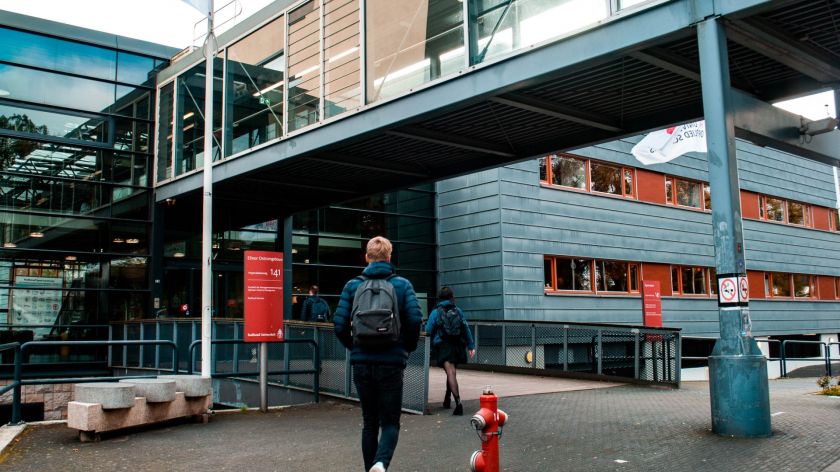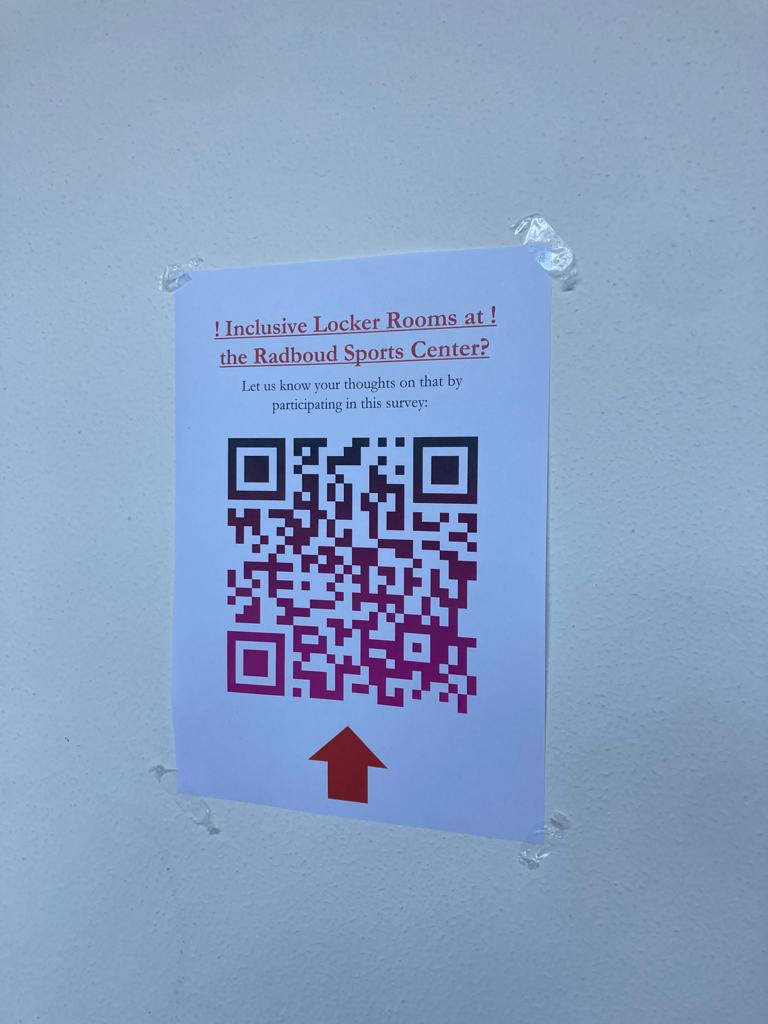Students want discussion on inclusive changing room in sports centre
-
 Het sportcentrum. Foto: Diede van der Vleuten
Het sportcentrum. Foto: Diede van der Vleuten
If it's up to a student think tank, there will be an inclusive changing room at the sports centre. Such a changing room is especially nice for people who don't fit into a particular gender category. The group hung flyers in the sports centre. 'I feel really uneasy if I'm in the men's changing room.'
If Jill (23) wants to change into exercise clothing at Radboud Sports Centre (RSC), there’s immediately an uncomfortable situation. Jill is trans and identifies as female. ‘But not everyone knows that yet,’ Jill tells us. So Jill prefers to remain anonymous and uses the neutral pronouns (they/them).
Which changing room does Jill choose? It’s still the male changing room. ‘Because a lot of people don’t regard me as being female,’ Jill says. ‘However, I feel really uneasy when I’m there,’ they say. Getting changed is accompanied by a lot of discomfort plus the fear that others will stare or comment. And that does sometimes happen, according to Jill.
Inclusive changing room
For the subject ‘Think tank’ in the Arts minor, Jill and fellow students came up with a survey of people’s views on an inclusive changing room. To be clear, it’s not about all changing rooms. Just one of the existing ones would be given a different use in their plan. It would be a space where, for example, trans, non-binary or intersex people could get changed without any discomfort.
Think tanks
The Gender and Diversity think tank collaborates with the Diversity, Equity & Inclusion office (DEI). DEI also has a think tank on racism. The student think tanks have been in existence since 2020. ‘They often contain students who are personally dealing with the subject and are well able to make useful suggestions,’ says diversity officer Rona Jualla van Oudenhoven.
According to Jill, research shows that people who don’t fit into gender categories often feel uneasy at the gym and in changing rooms. That is particularly the case if they are in transition (the process of changing the gender socially or physically, ed.). Visitors can fill in the questionnaire through flyers with a QR code that the think tank students hung up in the sports centre. Up till now, around 60 people – with a variety of gender identities – have completed the questionnaire.
Safe space
Just over half the respondents answered ‘yes’ when asked if they would be in favour of a separate inclusive changing room. One fifth was against the idea and yet another fifth needed more information or felt that it depended on the situation. ‘Initially, the responses were overwhelmingly negative,’ says Jill. ‘That surprised me.’ One person wrote that they didn’t want to be looked at by people who might feel attracted to them.
‘People like that feel uncomfortable changing clothes in front of others anyway’
‘That person forgot that there are also homosexual and bisexual people. Another person wrote that such a changing room could be used by people with the wrong ideas. That’s an argument I hear more often from people who don’t feel that trans women are women, but men pretending to be female so they can enter a safe space.’ Jill counters that argument by pointing out that at present, anyone can walk into every changing room anyway. ‘And men and women can naturally hassle each other too’.
The think tank also asked visitors if they themselves would feel at ease in an inclusive changing room. The majority said they would not. Jill thinks that’s because most people are cis gender (their gender identity corresponds with the gender designated at birth, ed.). ‘Some non-binary or trans people also indicated that they would not feel at ease in such a space,’ says Jill. ‘People like that feel uncomfortable changing clothes in front of others anyway.’ Jill feels that a separate cubicle or a curtain partition in the changing room might also be an idea.
Pilot
On 1 May, the think tank will be talk about the survey with the Campus Development department and the RSC. ‘We used many open-ended questions to allow people to make suggestions,’ says Jill.
‘Modifying changing rooms is not on the agenda at present, but we are very interested to know the students’ opinions,’ says Joris Hermans, Head of Sports. The sports centre is currently looking at the possibilities of more inclusive toilets. ‘We are inventorying whether the old ones need to be replaced and if that’s the case, the Campus Development department thinks it would be a good idea to incorporate inclusiveness into the new ones,’ says Hermans.
He is seeing that many other sports organisations are dealing with the issue surrounding changing rooms. ‘If such a separate changing room seems to be the best solution for improved inclusiveness, we are certainly willing to consider a pilot.’




